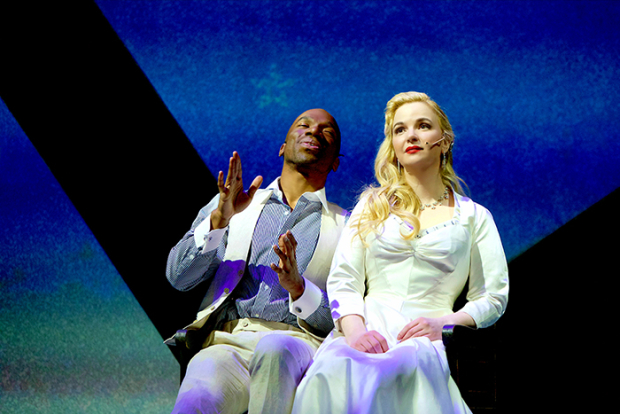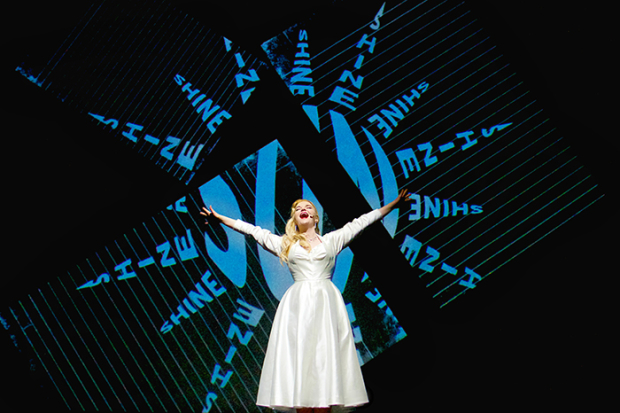Sincerely, Oscar Sings Insincerely Through the Career of Oscar Hammerstein II
A hologram of Hammerstein narrates the iconic career of the ”Oklahoma!”, ”Carousel”, and ”South Pacific” lyricist.

(© Derek Brad)
The first signs of trouble in Sincerely, Oscar come early, as Doreen Taylor opens her Oscar Hammerstein II retrospective singing Show Boat's "Can't Help Lovin Dat Man" (uncomfortable emphasis by Taylor on every dat). Of course, there's no rule against white women singing the beautiful songs from Jerome Kern and Hammerstein's 1927 score. But the choice is tone deaf, which is the best way to sum up the entire experience of Sincerely, Oscar, an overwrought and overdesigned musical revue now running off-Broadway at Theatre Row. (And for those eager to note that Tony winner Beth Leavel sang "Ol' Man River" at MCC's recent gala, please also note that the name of that gala is Miscast.)
Racial insensitivities aside, Sincerely, Oscar suffers from a general lack of self-awareness, which manifests in every design, directorial, and musical choice — but let's start with the hologram.
Hologram Hammerstein (voiced by Bob Meenan) narrates his own career, reciting excerpts from interviews, personal correspondence, and other firsthand sources. These spoken interludes, which include recurring meditations on the word "dream," are meant to track Hammerstein's development as a lyricist (primarily as the other half of Rodgers and Hammerstein) and introduce the next musical on his professional timeline.
All the while, his 3-D likeness scratches down notes on a yellow legal pad or clacks away at his typewriter. The apparition then dissipates into the ether — sometimes exploding into a swarm of butterflies, other times swallowed up by an atomic mushroom cloud. The blatant "more is more" philosophy likely stems from an overenthusiasm about the sophisticated hologram technology, but director Dugg McDonough lets it consume the rest of the production — most notably Brittany Merenda's projections, which are distractingly literal interpretations of the song lyrics (I'll let you guess which song featured a billboard-size animation of a waving fringe).
Taylor, who also penned the book for Sincerely, Oscar, assigns herself the majority of the song list, even turning "If I Loved You" from Carousel into a solo number inexplicably set during a thunderstorm. But occasionally she shares songs (or hands them over entirely) to her costar Azudi Onyejekwe, whose voice sounds perfectly pleasant in numbers like "You've Got to Be Carefully Taught" from South Pacific or "Shall We Dance" from The King and I. Taylor's voice is also quite capable, though usually overpowered by a melodramatic performance ending in an Evita pose.
The bigger musical problem, however, is in the monotonous jazz arrangements that scrub every ounce of character out of Hammerstein's greatest hits. Though entirely silly, phantom Hammerstein explains his motivations for writing about forward-looking themes like racial prejudice and British imperialism and domestic abuse — albeit imperfectly, as revival productions often reveal. As those themes are drowned out by the sounds of hologram machinery and elevator music, you can't help but think that if Hammerstein were here in body, he wouldn't be so eager to sign his name to this project.

(© Derek Brad)







